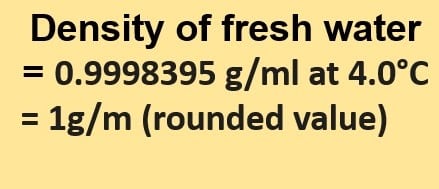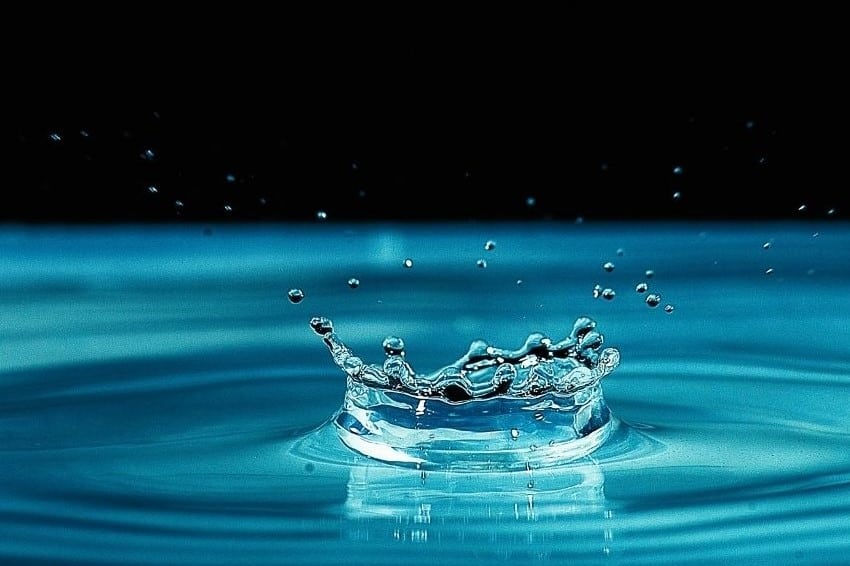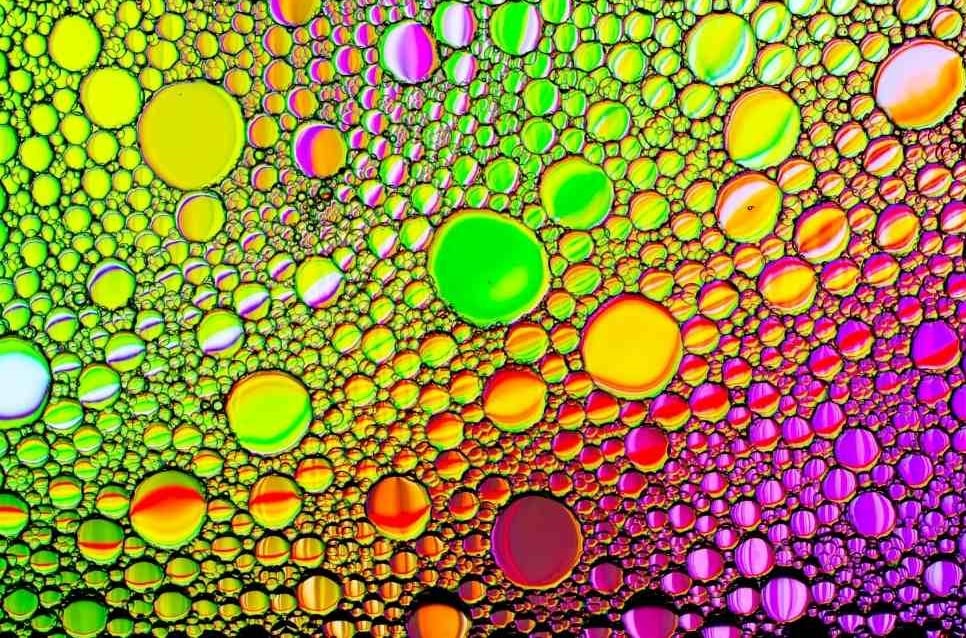The specific gravity of an object is defined as the density of that object divided by the density of water. Water has a density of 1,000 kilograms per cubic meter. In other words, specific gravity is defined as the ratio of a material’s density to that of water at 4 °C (where it is most dense and is taken to have a value of 999.974 kg m-3). As a result, it is a relative quantity with no units. The specific gravity of water is one at 4 degrees Celsius, as this value is the standard value used by scientists to determine the specific gravity of different substances. However, a water sample at a different temperature or pressure, or one containing impurities, on the other hand, has a slightly different density.

Table of Contents
The Specific Gravity Formula and Unit
Specific gravity of an object = ρobject / ρH2O
ρobect = density of the fluid or object [kg/m3].
ρH2O = density of water-normally at a temperature of 4 oC [kg/m3].
Specific gravity is a dimensionless quantity, which means that it cannot be expressed in units.
The specific gravity symbol is usually SG, or sometimes just G.
Specific Gravity vs. Density
The definition of density is mass per unit volume. It is an absolute number using the SI unit of kg m-3 or kg/m3. The specific gravity of a material is the ratio of its density to that of water at 4 °C (where it is most dense and is taken to have a value of 999.974 kg m-3).
As a result, it is a relative number with no units.
Summary
- The specific gravity of an object is defined as the density of that object divided by the density of water.
- It is a relative quantity with no units.
- The specific gravity of water is one at 4 degrees Celsius.
- A water sample at a different temperature or pressure, or one containing impurities, on the other hand, has a slightly different density.
Related Topics
The Viscosity of Water| Definition of Viscosity
The density of Water in g/ml-Accurate Value
The pH of Distilled/ De-Ionized Water
Surface Tension of Water
Boiling of Water
Unit Weight of Water| Specific Weight
Frequently Asked Question
Some of the frequently asked questions are given below
1. How to calculate the specific gravity of seawater?
The specific gravity of seawater is the density of a sample of seawater at a specific temperature divided by the density of pure water at a specific temperature.
2. What is a water molecule and how many hydrogen atoms are in a water molecule?
Water is a substance that exists in gaseous, liquid, or solid phases and is made up of the chemical elements hydrogen and oxygen. It is one of the most abundant and necessary chemicals. At room temperature, it is a tasteless and odorless liquid with the critical capacity to dissolve many other compounds. Water’s capacity as a solvent is critical to living creatures.
A water molecule consists of two hydrogen atoms attached to the sides of a single oxygen atom.
3. What is the specific gravity of water?
Water has a specific gravity of 1 at 4 degrees Celsius because this is the standard value used by scientists to determine the specific gravity of various substances. However, a water sample was taken at a different temperature or pressure, or one that contains impurities has a slightly different specific gravity value.
4. What is the specific heat formula?
Specific heat formula is the amount of heat supplied to the specimen, divided by the resulting temperature increase. cp is related to the unit mass of the specimen. The mathematical form of the formula is Q/m ΔT = cp, where Q refers to the amount of heat supplied to the specimen and ΔT is the rise in temperature.
5. What is the weight of water in kg?
At 25°C (77°F or 298.15K), the weight of water is1 gram per cubic centimeter, or 1,000 kilograms per cubic meter. This means that the density of water is 1 000 kg/m3. Weight per cubic foot: 62.4 pounds per cubic foot [lb/ft3], or 0.58 ounces per cubic inch [oz/inch3].
6. What is the importance of water in weathering?
Water is extremely important in chemical weathering in three ways. First, it reacts with carbon dioxide in the soil to form carbonic acid, a weak acid. Finally, hydrolysis can be used by water to break up minerals. This process decomposes the most common mineral group, silicates.
7. What is the density of water in lbft3?
Density is a physical property that expresses the mass per unit volume. In the case of liquid water, the density of water is close to 1000 kg/m3, though it varies slightly depending on temperature. The density of water in lb/ft3 is 62.428 lb/ft3.
8. What is the specific gravity of olive oil with density in lb/ft3?
The density of water (lb/ft3) at (approximately 4oC) is 62.428 lb/ft3.
The density of olive oil is 57.3 lb/ft3.
The specific gravity of olive oil is 57.3 lb/ft3/62.428 lb/ft3.
The specific gravity of olive oil is 0.917.
More Interesting Topics
- BCl3 Lewis Structure in four simple steps - November 1, 2023
- PH3 Lewis Structure in four simple steps - October 8, 2023
- PF3 Lewis structure in four simple steps - September 24, 2023



